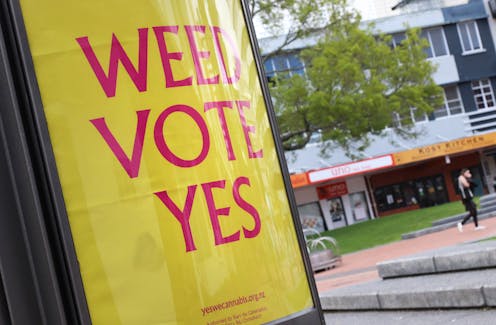The numbers suggest the campaign for cannabis reform in NZ will outlive the generations that voted against it
- Written by The Conversation

Reactions to the result of the cannabis referendum[1] were highly polarised. Some argued the majority verdict must be accepted. Others pointed to the narrow margin — 50.7% to 48.4% — as evidence that the issue is still alive politically.
The government, however, has seemingly signalled a desire to move on. Before the announcement of the special vote count that narrowed the election night margin considerably, the then justice minister, Andrew Little, said[2]:
The electorate has spoken, they are uncomfortable with greater legalisation and […] decriminalisation of recreational cannabis. The New Zealand electorate is not ready for that, and I think we have to respect that.
Prime Minister Jacinda Ardern echoed[3] those sentiments:
When it comes to a referendum, a majority is a majority and so it hasn’t tipped the balance in terms of what we as a government will do. We gave our commitment to New Zealanders if it won the majority, we would progress legislation. If it didn’t, we wouldn’t.
In the short term, such judgments are understandable. Legalising recreational cannabis use is not an issue a government might need on its policy agenda right now. But in the medium to long term, the wisdom of pushing the matter aside is questionable.
The age factor
Referendums are crude devices and the idea of a “New Zealand electorate” that has collectively spoken is simplistic.
In reality, the electorate is made up of individuals with opinions on cannabis that are far more complex than voting yes or no could adequately express. In particular, the referendum question[4] did not allow a decriminalisation option. There is no basis for interpreting the result as ruling that out.
Read more: If reducing harm to society is the goal, a cost-benefit analysis shows cannabis prohibition has failed[5]
As with the vote on Brexit in Britain, which the old strongly supported[6] and the young strongly opposed, New Zealand’s cannabis referendum results were defined by age.
Post-election survey data provided by Vox Pop Labs[7] for Vote Compass[8] suggest a majority of those over 50 voted against legalisation. A majority of those under 50 voted for it.
Given the narrowness of the margin, assuming preferences remain roughly the same by age and these data are reasonably accurate, it will not be long before generational replacement within the electorate produces a majority for legalisation and control.
Calls for a second vote
Nor do referendums necessarily produce outcomes that are permanently binding. In 1993, New Zealanders voted for MMP, but there was a second (also successful) MMP referendum in 2011 — to “kick the tyres[9]”, as the then prime minister, John Key, put it.
The Brexit vote was also close, and there was a strong campaign for a second referendum[10] once the full implications of Britain withdrawing from the European Union became more apparent than they had been at the time of voting.
Read more: New Zealand's new parliament turns red: final 2020 election results at a glance[11]
A second referendum would likely have reversed the outcome, as more young people would have entered the electorate while many older people would have died in the interim.
The poor quality of debate and widely publicised lies[12] leading up to the decisive vote also fuelled demands for a second Brexit referendum.
The cannabis debate never descended to Brexit levels, although there were accusations[13] the anti-legalisation camp used misinformation to support its cause. But there was also another contentious referendum topic (assisted dying), not to mention a general election, consuming media attention and crowding out informed debate.
Another chance for change
As well, the campaign in favour of change was ill-organised and ineffective, if not naive. The proposed legislation involved two concepts: legalisation and control. The most important of these was control, but the issue in many people’s minds came down to legalisation of what they believed to be a harmful and dangerous drug.
Read more: New law gives NZ police discretion not to prosecute drug users, but to offer addiction support instead[14]
Such a belief can only have been based on two implicit assumptions: that the existing law is effective in reducing harm and damage, and legalisation would increase the odds of harm and damage.
Neither of those assumptions has any basis in evidence[15]. The real debate should have been about controlling various aspects of existing use: criminality, strength of product, age thresholds, taxation and health education.
Given that another referendum in the not-too-distant future could well have a different outcome, there are good reasons to continue the campaign for change.
References
- ^ cannabis referendum (www.electionresults.govt.nz)
- ^ said (www.stuff.co.nz)
- ^ echoed (www.tvnz.co.nz)
- ^ referendum question (www.referendums.govt.nz)
- ^ If reducing harm to society is the goal, a cost-benefit analysis shows cannabis prohibition has failed (theconversation.com)
- ^ old strongly supported (time.com)
- ^ Vox Pop Labs (voxpoplabs.com)
- ^ Vote Compass (votecompass.tvnz.co.nz)
- ^ kick the tyres (www.stuff.co.nz)
- ^ second referendum (www.reuters.com)
- ^ New Zealand's new parliament turns red: final 2020 election results at a glance (theconversation.com)
- ^ widely publicised lies (www.independent.co.uk)
- ^ accusations (www.stuff.co.nz)
- ^ New law gives NZ police discretion not to prosecute drug users, but to offer addiction support instead (theconversation.com)
- ^ evidence (www.pmcsa.ac.nz)

















